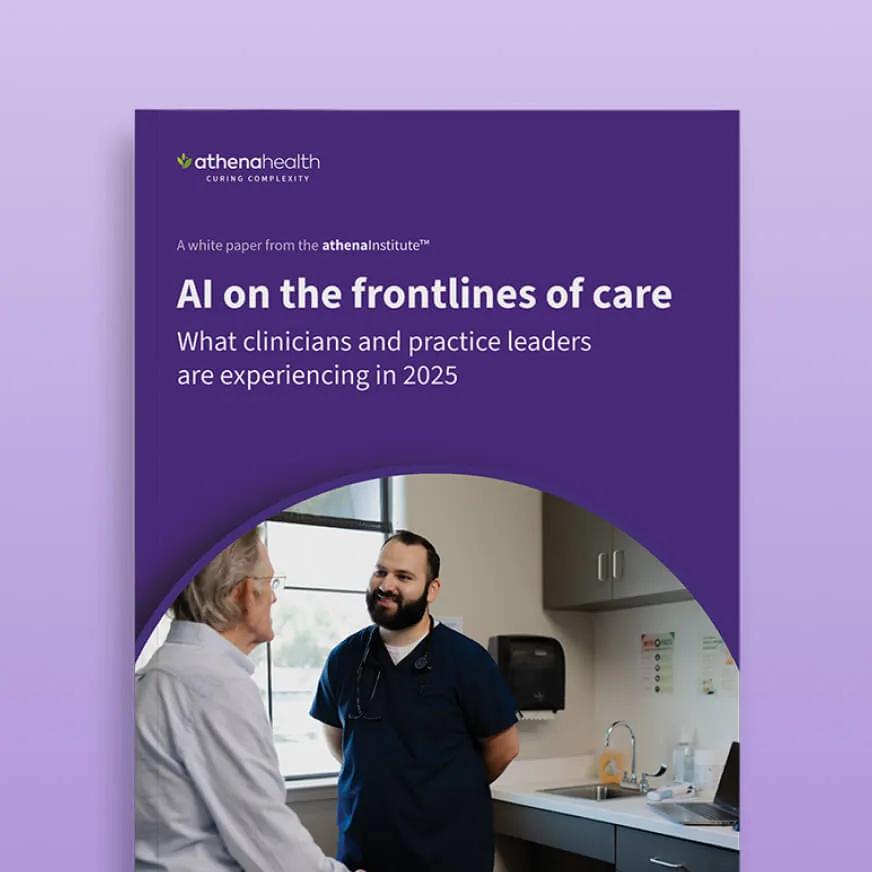Healthcare AI moving beyond the hype toward practical AI-native solutions
Artificial intelligence (AI) is often discussed in healthcare in sweeping, futuristic terms. Conversations gravitate toward AI’s potential to revolutionize diagnostics, reshape treatment plans, and even replace aspects of clinical decision-making.
These topics fuel headlines, but they overlook the most immediate and transformative applications of AI — streamlining the administrative burdens that weigh down our healthcare system and lead to burnout among clinicians.
At athenahealth, we work with thousands of physicians across the country, and we hear the same message time and time again: doctors want to treat patients, not spend hours filling out forms, navigating regulatory requirements, or battling outdated administrative workflows. The crisis in primary care is real — small practices are closing, burnout is rampant, and patients are struggling to find providers with the time to truly engage in their care. AI presents an opportunity to fix this — not by replacing the physician, but by eliminating the inefficiencies that stand between providers and their patients.
AI isn’t about replacing physicians. It’s about giving them the time and tools to practice medicine the way they always intended.
Physician skepticism and overcoming the EHR hangover with smarter technology
If we want AI to succeed in healthcare, we have to start by acknowledging the elephant in the room — doctors are skeptical of new technology, and they have every reason to be. Electronic health records (EHRs) entered the scene with promises of streamlined care. But for many, they delivered the opposite — more clicks, more disruption, more time looking at screens than at patients. This created a lasting sense of frustration and a healthy skepticism about new technology claiming to “help.”
AI cannot afford to make the same mistakes. The path to overcoming physician skepticism is simple: Technology must prove it reduces complexity without demanding more from already overburdened users. That means designing tools that work in the background — not ones that require doctors to master yet another complex system.
Consider ambient AI tools such as our Ambient Notes. These systems listen during patient visits and generate clinical documentation in real time, for the provider to review. Instead of hunting through EHR menus or manually entering notes, doctors can focus on their patients while AI handles the paperwork.
But what makes our approach different is that the AI is built into a single, intelligent platform that continuously learns from practices across the largest connected health data network. The technology is already in use across clinics and practices, and the feedback has been overwhelmingly positive.
AI’s greatest strength: Reducing administrative complexity with intelligent automation
In healthcare, transactions are needlessly complex. Billing, insurance claims, compliance requirements, and record-keeping create a mountain of administrative work. AI can alleviate this burden by automating redundant tasks, improving data accuracy, and streamlining workflows. Instead of requiring physicians and staff to manually reconcile missing data points or submit endless documentation for reimbursement, AI can analyze records, predict errors, and verify identity and insurance information.
Think about the front office staff verifying insurance coverage or the biller chasing down missing codes. These are real people doing critical but repetitive work — and AI can help make their jobs faster, more accurate, and less stressful.
Similarly, AI-powered tools can analyze clinical documentation in real time, helping physicians meet regulatory requirements without adding extra steps to their workflow.
Thanks to deeply integrated AI features, from predictive workflows to agentic revenue cycle tools, these solutions don’t just automate tasks, they transform how care teams collaborate, making every step smarter and more human.
Fixing the system from the inside out by prioritizing interoperability and integrated AI
Healthcare isn’t like other industries — and that makes AI harder to implement. While other sectors can deploy AI seamlessly across standardized platforms, healthcare is built on a fragmented foundation: private vendors, proprietary systems, and regulatory hurdles. This patchwork slows down adoption and limits AI’s ability to address the biggest pain points.
For AI to deliver on its promise, healthcare organizations and policymakers alike must prioritize interoperability and integration. Tools must talk to one another, and systems must work across different environments — especially for independent practices that don’t have the resources to piece together complex tech stacks.
Policy should reflect that AI is not a singular entity that requires heavy-handed regulation but rather a set of tools that can be integrated into existing healthcare frameworks.
With decades of ambulatory care experience and a continuous pipeline of new AI-native capabilities launching this year, our platform evolves alongside real customer needs, ensuring it fits clinical workflows, operational challenges, and patient engagement.
Policymakers and the need to modernize regulations for practical adoption
While AI has real potential to reduce burnout and cure complexity, policy decisions made today will shape how — and whether — that potential is realized. We don’t need sweeping new AI-specific legislation — we need to modernize existing frameworks to accommodate how AI is used today. The focus should be on ensuring current rules support safe, ethical, and practical deployment of AI to improve care and reduce burden — not on regulating the concept of AI itself.
The real impact: Alleviating burnout and strengthening care
Physician burnout is one of the greatest challenges in healthcare today — and according to our 2025 Physician Sentiment Survey, we’re starting to see signs of progress. Day-to-day sentiment is improving, with two-thirds of physicians saying they look forward to coming to work at least once a week. Even more notably, the number of doctors considering leaving the profession on a weekly basis has declined by 22% (from 36% in 2024 to 28% in 2025). This shift in outlook comes as more physicians report that AI is helping reduce administrative burden — long one of the main drivers of burnout.
Instead of forcing doctors to spend their evenings completing progress notes in order to get paid, AI can automate documentation and compliance tracking. Instead of requiring primary care physicians to navigate a maze of insurance policies and prior authorizations, AI can handle these processes in the background, ensuring patients receive timely care.
Healthcare is at an inflection point. We can either continue burdening clinicians with administrative complexity, or we can use AI to simplify workflows and return the focus to patient care. If we make the right choices, such as prioritizing practical AI applications, modernizing outdated regulations, and fostering interoperability, AI will not only transform healthcare operations but also strengthen the provider-patient relationship.
At athenahealth, our focus is on building technology that enables clinicians to do what they do best: care for their patients. Our native AI solutions aren’t about replacing physicians, they’re about giving them the time and tools to practice medicine the way they always intended.
More AI in healthcare resources
Continue exploring
1. 2025 Physician Sentiment Survey of 1,001 physicians nationwide, commissioned by athenahealth and fielded by Harris Poll, Jan 2025.













